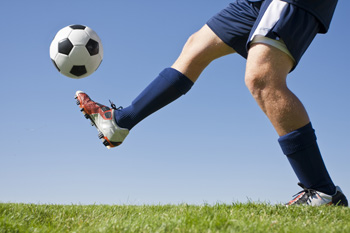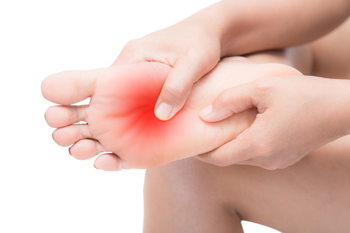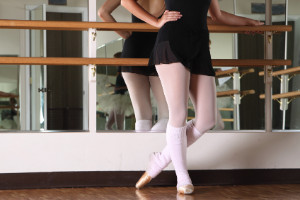Items filtered by date: June 2019
Cracked Heels Can Cause Difficulty in Walking
 The uncomfortable condition that is known as cracked heels can develop for a variety of reasons. If the climate is cold and dry, the risk of having this ailment may increase. Additionally, the skin on the heels can become dry if medical conditions exist that include eczema and psoriasis. Another common cause of this condition is wearing shoes that have an open back. Mild relief may be found by washing the feet in warm water, followed by using a good moisturizer. If you have children, it is important to notice if they have cracked heels, and are having difficulty walking. If this pertains to you or your child, it is advised to consult with a podiatrist as quickly as possible so the correct treatment can begin.
The uncomfortable condition that is known as cracked heels can develop for a variety of reasons. If the climate is cold and dry, the risk of having this ailment may increase. Additionally, the skin on the heels can become dry if medical conditions exist that include eczema and psoriasis. Another common cause of this condition is wearing shoes that have an open back. Mild relief may be found by washing the feet in warm water, followed by using a good moisturizer. If you have children, it is important to notice if they have cracked heels, and are having difficulty walking. If this pertains to you or your child, it is advised to consult with a podiatrist as quickly as possible so the correct treatment can begin.
Cracked heels are unsightly and can cause further damage to your shoes and feet. If you have any concerns, contact one of our podiatrists from Princeton Foot & Ankle Associates. Our doctors can provide the care you need to keep you pain-free and on your feet.
Cracked Heels
Cracked heels appear unappealing and can make it harder for you walk around in sandals. Aside from looking unpleasant, cracked heels can also tear stockings, socks, and wear out your shoes. There are several methods to help restore a cracked heel and prevent further damage.
How Do You Get Them?
Dry skin is the number one culprit in creating cracked heels. Many athletes, walkers, joggers, and even swimmers suffer from cracked heels. Age and skin oil production play a role to getting cracked heels as well.
Promote Healing
Over the counter medicines can help, especially for those that need instant relief or who suffer from chronic dry feet.
Wear Socks – Wearing socks with medicated creams helps lock in moisture.
Moisturizers – Applying both day and night will help alleviate dryness which causes cracking.
Pumice Stones – These exfoliate and remove dead skin, which allows for smoother moisturizer application and better absorption into the skin.
Change in Diet
Eating healthy with a well-balanced diet will give the skin a fresh and radiant look. Your body responds to the kinds of food you ingest. Omega-3 fatty acids and zinc supplements can also revitalize skin tissue.
Most importantly, seek professional help if unsure how to proceed in treating cracked heels. A podiatrist will help you with any questions or information needed.
If you have any questions, please feel free to contact our offices located in Princeton, and West Windsor, NJ . We offer the newest diagnostic and treatment technologies for all your foot care needs.
Which Athletes Hurt Their Feet the Most
 Athletes are known to have many foot and ankle complications. Some issues tend to affect the athletes of specific sports more than others. For example, “turf toe” is common among those who participate in football, soccer, basketball, wrestling, gymnastics, and dance. Turf toe is the spraining of the big toe joint. Another usual injury among athletes is a stress fracture. Those who run and jump on hard surfaces, such as runners, basketball players, and dancers, commonly experience fractures. Additionally, Achilles tendonitis, which is the inflammation of the back of your ankle, is seen among basketball and tennis players. Finally, a pinched nerve condition known as tarsal tunnel syndrome is seen among various types of athletes. Considering the extra stress athletes put on their bodies, it is no surprise that they are prone to foot and ankle injuries. These people in particular should look out for complications so they can continue performing in their respective sport effectively. If you believe you may have a foot or ankle injury due to a sport, you should contact a podiatrist.
Athletes are known to have many foot and ankle complications. Some issues tend to affect the athletes of specific sports more than others. For example, “turf toe” is common among those who participate in football, soccer, basketball, wrestling, gymnastics, and dance. Turf toe is the spraining of the big toe joint. Another usual injury among athletes is a stress fracture. Those who run and jump on hard surfaces, such as runners, basketball players, and dancers, commonly experience fractures. Additionally, Achilles tendonitis, which is the inflammation of the back of your ankle, is seen among basketball and tennis players. Finally, a pinched nerve condition known as tarsal tunnel syndrome is seen among various types of athletes. Considering the extra stress athletes put on their bodies, it is no surprise that they are prone to foot and ankle injuries. These people in particular should look out for complications so they can continue performing in their respective sport effectively. If you believe you may have a foot or ankle injury due to a sport, you should contact a podiatrist.
Ankle and foot injuries are common among athletes and in many sports. They can be caused by several problems and may be potentially serious. If you are feeling pain or think you were injured in a sporting event or when exercising, consult with one of our podiatrists from Princeton Foot & Ankle Associates. Our doctors will assess your condition and provide you with quality foot and ankle treatment.
Common Injuries
The most common injuries that occur in sporting activities include:
- Achilles Tendonitis
- Achilles Tendon Rupture
- Ankle Sprains
- Broken Foot
- Plantar Fasciitis
- Stress Fractures
- Turf Toe
Symptoms
Symptoms vary depending upon the injury and in some cases, there may be no symptoms at all. However, in most cases, some form of symptom is experienced. Pain, aching, burning, bruising, tenderness, tightness or stiffness, sensation loss, difficulty moving, and swelling are the most common symptoms.
Treatment
Just as symptoms vary depending upon the injury, so do treatment options. A common treatment method is known as the RICE method. This method involves rest, applying ice, compression and elevating the afflicted foot or ankle. If the injury appears to be more serious, surgery might be required, such as arthroscopic or reconstructive surgery. Lastly, rehabilitation or therapy might be needed to gain full functionality in the afflicted area. Any discomfort experienced by an athlete must be evaluated by a licensed, reputable medical professional.
If you have any questions, please feel free to contact our offices located in Princeton, and West Windsor, NJ . We offer the newest diagnostic and treatment technologies for all your foot care needs.
The Feet and Rheumatoid Arthritis
 Most people with rheumatoid arthritis experience pain in their feet at some point during their time with the ailment. Understanding the disease and the effects it could have on the feet may help you recognize the problem early and begin treatment. Rheumatoid arthritis is a disease in which the body attacks its own joints. This disease is unique in that many joints may be impacted at the same time. People with the disease may notice the development of bunions, hammertoes, and fallen arches. Additional foot complications affiliated with rheumatoid arthritis include heel pain, pinched nerves, nodules and rashes. The condition is painful and incurable. However, early treatment can help people with the disease control the discomfort and maintain their livelihoods. If you are experiencing any type of foot pain, it is suggested that you consult with a podiatrist.
Most people with rheumatoid arthritis experience pain in their feet at some point during their time with the ailment. Understanding the disease and the effects it could have on the feet may help you recognize the problem early and begin treatment. Rheumatoid arthritis is a disease in which the body attacks its own joints. This disease is unique in that many joints may be impacted at the same time. People with the disease may notice the development of bunions, hammertoes, and fallen arches. Additional foot complications affiliated with rheumatoid arthritis include heel pain, pinched nerves, nodules and rashes. The condition is painful and incurable. However, early treatment can help people with the disease control the discomfort and maintain their livelihoods. If you are experiencing any type of foot pain, it is suggested that you consult with a podiatrist.
Because RA affects more than just your joints, including the joints in your feet and ankles, it is important to seek early diagnosis from your podiatrist if you feel like the pain in your feet might be caused by RA. For more information, contact one of our podiatrists of Princeton Foot & Ankle Associates. Our doctors will assist you with all of your podiatric concerns.
What Is Rheumatoid Arthritis?
Rheumatoid Arthritis (RA) is an autoimmune disorder in which the body’s own immune system attacks the membranes surrounding the joints. Inflammation of the lining and eventually the destruction of the joint’s cartilage and bone occur, causing severe pain and immobility.
Rheumatoid Arthritis of the Feet
Although RA usually attacks multiple bones and joints throughout the entire body, almost 90 percent of cases result in pain in the foot or ankle area.
Symptoms
- Swelling and pain in the feet
- Stiffness in the feet
- Pain on the ball or sole of feet
- Joint shift and deformation
Diagnosis
Quick diagnosis of RA in the feet is important so that the podiatrist can treat the area effectively. Your doctor will ask you about your medical history, occupation, and lifestyle to determine the origin of the condition. Rheumatoid Factor tests help to determine if someone is affected by the disease.
If you have any questions please feel free to contact our offices located in Princeton, and West Windsor, NJ . We offer the newest diagnostic and treatment technologies for all your foot and ankle needs.
Heel Pain Can Be Treated!
Ballet Dancers and Ingrown Toenails
 Research has indicated many ballet dancers are afflicted with ingrown toenails. This is often the result of balancing on top of the toes, which can cause the corner of the nail to grow into the surrounding skin. An ingrown toenail typically causes pain and discomfort and may become infected if it is not treated promptly. Many ballet dancers may notice soreness while putting on ballet slippers and pointing the toes can cause extreme pain. Some of the symptoms associated with ingrown toenails can include swelling around the nail, or you may notice a discharge draining from the nail. Mild relief can be found when the toe is soaked in warm water and is helpful in softening the skin around the affected area. If you feel you have an ingrown toenail, consult with a podiatrist so proper treatment can begin.
Research has indicated many ballet dancers are afflicted with ingrown toenails. This is often the result of balancing on top of the toes, which can cause the corner of the nail to grow into the surrounding skin. An ingrown toenail typically causes pain and discomfort and may become infected if it is not treated promptly. Many ballet dancers may notice soreness while putting on ballet slippers and pointing the toes can cause extreme pain. Some of the symptoms associated with ingrown toenails can include swelling around the nail, or you may notice a discharge draining from the nail. Mild relief can be found when the toe is soaked in warm water and is helpful in softening the skin around the affected area. If you feel you have an ingrown toenail, consult with a podiatrist so proper treatment can begin.
Ingrown toenails can become painful if they are not treated properly. For more information about ingrown toenails, contact one of our podiatrists of Princeton Foot & Ankle Associates. Our doctors can provide the care you need to keep you pain-free and on your feet.
Ingrown Toenails
Ingrown toenails occur when a toenail grows sideways into the bed of the nail, causing pain, swelling, and possibly infection.
Causes
- Bacterial infections
- Improper nail cutting such as cutting it too short or not straight across
- Trauma to the toe, such as stubbing, which causes the nail to grow back irregularly
- Ill-fitting shoes that bunch the toes too close together
- Genetic predisposition
Prevention
Because ingrown toenails are not something found outside of shoe-wearing cultures, going barefoot as often as possible will decrease the likeliness of developing ingrown toenails. Wearing proper fitting shoes and using proper cutting techniques will also help decrease your risk of developing ingrown toenails.
Treatment
Ingrown toenails are a very treatable foot condition. In minor cases, soaking the affected area in salt or antibacterial soaps will not only help with the ingrown nail itself, but also help prevent any infections from occurring. In more severe cases, surgery is an option. In either case, speaking to your podiatrist about this condition will help you get a better understanding of specific treatment options that are right for you.
If you have any questions please feel free to contact our offices located in Princeton, and West Windsor, NJ . We offer the newest diagnostic and treatment technologies for all your foot and ankle needs.

